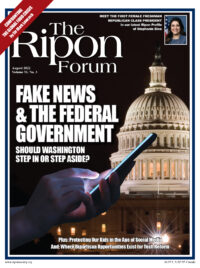 With the Biden Administration backing off its plans to create a Disinformation Governance Board, the latest edition of The Ripon Forum examines the effort to combat fake news in America and what the appropriate role of the federal government should be.
With the Biden Administration backing off its plans to create a Disinformation Governance Board, the latest edition of The Ripon Forum examines the effort to combat fake news in America and what the appropriate role of the federal government should be.
“Today, misinformation and its malicious sibling, disinformation, permeate U.S. society so thoroughly that citizens have no way of knowing which information is accurate,” writes Elisabeth Braw in our cover essay. “Someone needs to clean up the information environment, or otherwise, U.S. society will fragment as different groups believe different sources of information.”
Braw, a senior fellow at the American Enterprise Institute, argues that while citizens and the private sector must take the lead in combatting disinformation, Washington also has a small, albeit an important, role. “Because governments of liberal democracies would enter treacherous waters if they tried to regulate the public discourse,” she writes, “any U.S. government intervention into the information flow has to be limited to falsehoods spread by foreign governments.”
She also argues that, rather that creating a new board or commission, a federal entity is already in place that can achieve this goal. “The Global Engagement Center, a small unit within the State Department already tasked with countering foreign-led disinformation, could easily be expanded and given power to coordinate U.S. Government responses,” she writes.
Now that the White House has shelved the disinformation board, attention has turned to Capitol Hill to see what, if any, role Congress decides to play. According to Tom Romanoff of the Bipartisan Policy Center, there are a number of areas where common ground can be found. “If there is an opportunity for bipartisan legislation around curbing bias and misinformation online,” he writes, “it is in reforming Section 230 of the Communications Decency Act, either by adding carve-outs to the existing language or passing new laws to address issues that stem from misinformation online.”
In another essay, Diana Graber, the Founder of Cyber Civics & Cyberwise, highlights another reason why action is needed to clean up what is seen and viewed online — youth mental health. She argues that instead of waiting for policymakers to pass legislation that may or may not be effective, the focus instead should be on education and improving the digital literacy of kids. “Online misinformation, disinformation, clickbait, deepfakes, infinite scrolling, disturbing and graphic content, cyberbullying, and more are not going away any time soon and no law will protect kids from all these things,” she writes. “But youth armed with digital literacy skills will be less likely to believe information designed to mislead, fall into rabbit holes created by algorithms, be tricked by clickbait, seduced by persuasive technology, and they will know what to do when they encounter cruelty online.”
In a pair of op-eds examining the broader issue of federal authority and whether Washington has a role to play in regulating the Internet, Adam Kovacevich, the Founder and CEO of Chamber of Progress, and David Keating, the President of the Institute for Free Speech, take opposite sides of the question — “Social Media Platforms: Public Square or Private Property?”
With trust in government near an all-time low in part because of social media and online disinformation, Terry Gerton, the President and CEO of the National Academy of Public Administration, shares her thoughts on the steps that policymakers should take to get that trust back.
With Republicans favored to retake control of the House and possibly the Senate in November, Colgate Professor Emeritus Michael Hayes, in an essay, and George Mason Professor of Law Frank Buckley, in an interview, share their thoughts on the GOP’s future and the principles and philosophy the party should take to build a governing majority in the years ahead.
And in two essays examining a pair of crises gripping the world, Sir Mark Lowcock, the former Under-Secretary-General for Humanitarian Affairs and Emergency Relief Coordinator for the United Nations, and Giles Merritt, a former journalist and founder of the prominent EU think tank, Friends of Europe, assess the global food shortage and Russia’s invasion of Ukraine and the steps the U.S. and her allies should take to confront both.
And in our latest Ripon Profile, first-term Congresswoman Stephanie Bice (OK-5) discusses the issue facing America not receiving enough attention and the challenge facing her district she is working hard to address.
As always, we hope you find this latest edition of The Ripon Forum interesting and informative, and we welcome any comments or questions you might have.
Lou Zickar
Editor of The Ripon Forum
louzickar@clu.ccw.mybluehost.me




